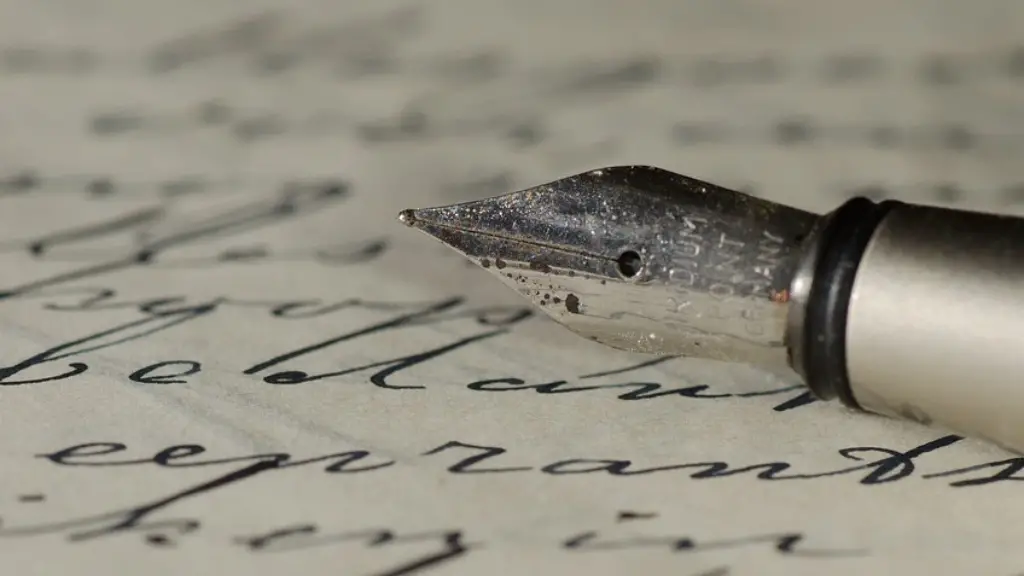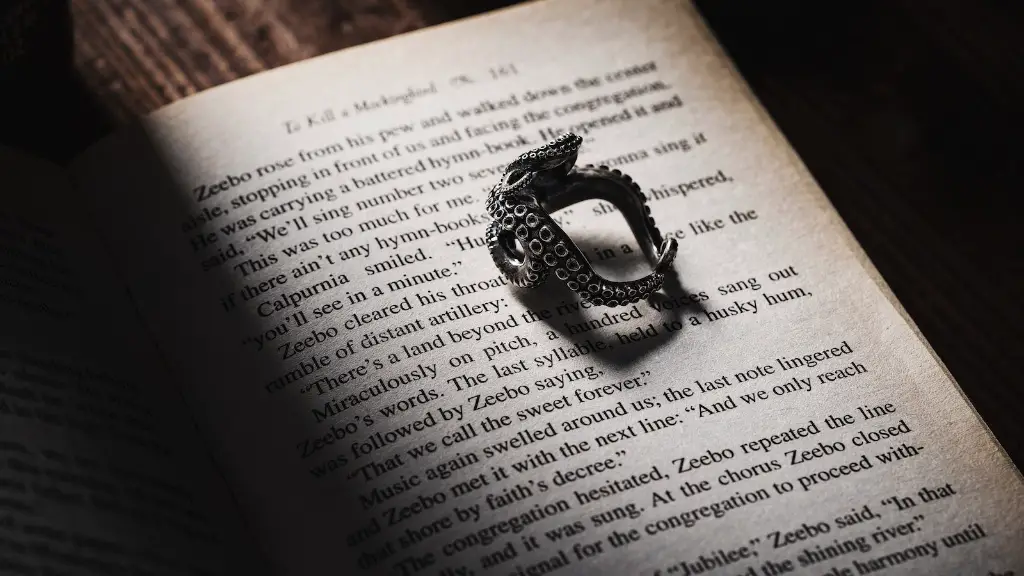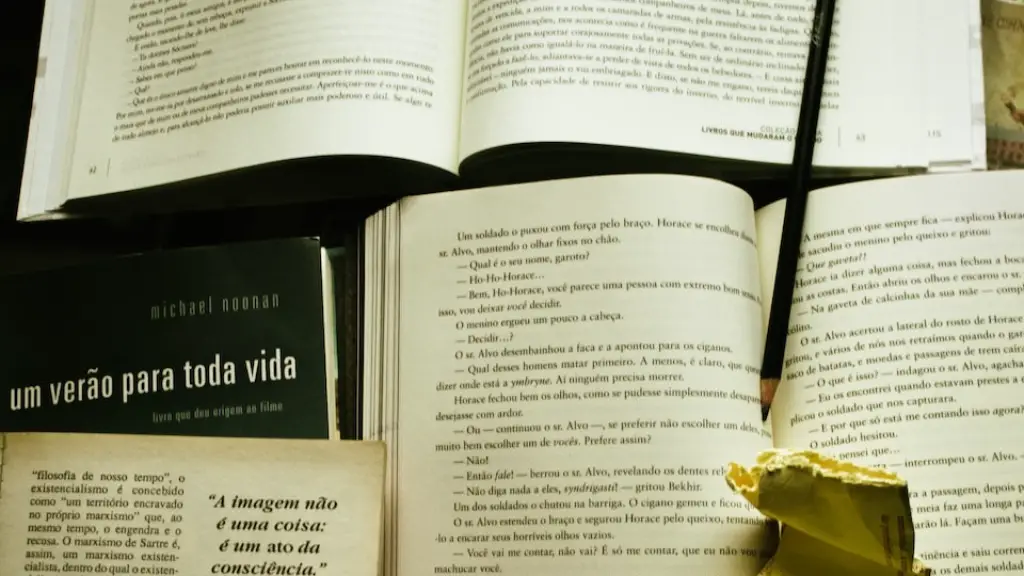Heroic poetry is a genre of literature and poetry that is characterized by lofty, sweeping themes, chivalry, and larger-than- life protagonists. It is a type of epic poetry, usually composed of lines in rhyme and metre, that is full of adventure, bravery, and dramatic events. Heroic poetry is usually related to heroism, valour and other heroic-type actions. It is a genre that flourished in many cultures, from classical times to medieval literature, and reached its full potential in the early modern period.
Heroes in heroic poetry are often a type of mythical creature or human figure that pursue a quest or have larger-than-life ambitions. They are frequently depicted as being brave, strong and courageous characters who seek justice, uphold honour and overcome their adversaries. Some examples of heroic poetry include ‘The Odyssey’ by Homer, ‘The Song of Roland’ by Anonymous, ‘Beowulf’ by Anonymous and ‘Parzival’ by Wolfram von Eschenbach. All these works of literature are considered important examples of the genre, and are highly influential in the way heroic poetry is viewed today.
Themes in heroic poetry often revolve around courage and bravery in the face of adversity. Examples of such themes can be found in ‘The Odyssey’, in which Odysseus battles divine monsters and embarks on a journey of eleven years, despite immense adversity. Similarly, in ‘Beowulf’, the protagonist seeks to slay the monster Grendel and avenge the deaths of the Danes. All these stories, regardless of their cultural background, show the same fundamental core of heroism: courage and strength despite the odds.
Expert scholars believe that heroic poetry is often an expression of a culture’s values and beliefs. It can be seen as a representation of a culture’s ideal figure, one who upholds the honour of the people, fights for justice and displays immense courage and strength in the face of adversity. It also reflects a societies’ admiration of heroism, courage and strength, and shows how a single person can achieve these values in the face of seemingly insurmountable odds.
My analysis suggest that even though heroic poetry has been around for thousands of years, it is still relevant today. It is a representation of man’s desire to strive for heroic behaviours in the face of adversity, and has served as an inspiration to people of many different cultures and periods. The themes and messages of heroic poetry have endured throughout time, and are as important today as they have ever been.
Relation To Other Genres
Heroic poetry is closely related to other genres such as epic poetry, chivalric romance and epic fantasy. All three genres have common themes and conventions, such as a hero who undertakes a mission or quest and faces adversaries while striving to fulfil his goals. These stories usually involve battles and war, and often deal with larger-than-life figures and events. These genres are interconnected and often draw from each other to create something new and unique.
Epics in particular are very closely related to heroic poetry and often share some of the same core elements. These can include a hero on a quest, a grand scale of events, larger-than-life figures, combat and extraordinary circumstances. However, epics tend to be more detailed and complex than heroic poetry, and typically involve story-telling on a grand scale. They also tend to be longer and more involved than heroic poetry, with more detailed character development and story-telling.
Chivalric romances, on the other hand, tend to focus more on the romantic aspects of heroic poetry. They often feature themes of courtly love and knightly honour, as well as deeds of valour and daring. The heroes in these stories tend to be romantic figures, and the adventures they undertake are typically much more whimsical and romantic in nature than those of heroic poetry.
Finally, epic fantasy is another closely related genre to heroic poetry. This genre borrows heavily from the conventions of heroic poetry and incorporates elements of other related genres, such as magic and other supernatural elements. These stories usually involve a hero on a quest who must battle evil forces in order to save the world. Characters in these stories are usually larger-than-life figures, and the narrative often involves grand battles, daring feats and other fantasy-inspired elements.
Influence On Other Genres
Heroic poetry has had a significant influence on many other genres of literature and art. For example, the conventions found in heroic poetry are often incorporated into stories in other genres, such as epic fantasies and superhero comics. This is because many of the same core elements, such as larger-than-life characters and dramatic events, are often present in these stories, and there is a deep-seated affinity between all these genres.
It is also important to note that heroic poetry has served as an inspiration to artists such as painters, sculptors and filmmakers. Many works of art have drawn inspiration from heroic poetry, and many pieces of literature have been adapted into films, paintings and other forms of media. This is because heroic poetry has a timeless quality to it, and its themes and conventions are often incredibly resonant and inspiring.
In addition, many contemporary authors have used heroic poetry as a source of inspiration for their work. For example, J. R. R. Tolkien’s epic fantasy series, The Lord of the Rings, draws heavily from heroic poetry and its conventions. Similarly, George R. R. Martin’s A Song of Ice and Fire series has many similarities to heroic poetry, and it draws heavily from the genre for its conventions and characters.
Significance In Modern Culture
Despite its ancient origins, heroic poetry is still a relevant and important genre in modern culture. Its themes and conventions have been a source of inspiration to many authors, artists and filmmakers. It continues to inspire stories and works of art, and it remains an important part of the cultural canon.
In addition, heroic poetry has also been used to explore modern themes and issues. Modern writers have often used elements of heroic poetry to explore topics such as gender, race and identity in a way that resonates with contemporary audiences. For example, the works of writers such as Madeline Miller, who retells the stories of The Iliad and The Odyssey from a female perspective, have shaken up traditional ideas of the heroic journey, and this has led to wider discussions of power and identity.
It is important to note that heroic poetry has also served as an inspiration to social movements. The heroic deeds of many heroes, such as Odysseus, Beowulf and Roland, have been seen as symbols of courage and strength, and have inspired people to strive for similar feats or causes. This shows us that, despite its age, heroic poetry still has an important role to play in our society.
The Impact Of Technology
In recent years, technology has had a profound effect on how the genre of heroic poetry is interpreted and understood. For example, with the advent of the internet and social media, stories and works of heroic poetry can be spread more easily and quickly than ever before. This has enabled people from all over the world to gain access to these stories and to share their interpretations and perspectives with others.
In addition, technology has also enabled people to re-interpret heroic poetry in new ways. With the rise of digital media, stories such as The Odyssey and Beowulf have been adapted into films and other interactive forms of media. This has opened up new opportunities for people to explore and re-imagine heroic poetry in a contemporary context, and to give the genre a new lease of life.
Finally, technology has also allowed people to explore the genre in more depth and detail than ever before. With the rise of online archives and library databases, people are now able to access a greater range of heroic poetry than ever before. This has enabled scholars to compare and contrast different works, and to gain a deeper insight into the genre and its conventions.
Conclusion
Heroic poetry is a genre of literature and poetry that is full of adventure, heroism, courage and strength. It is an ancient genre that has been around for thousands of years, and it continues to be an important source of inspiration for many authors, artists and filmmakers. It also continues to inspire social movements and has been used to explore modern issues such as gender, race and identity. Finally, technology has had a profound effect on how the genre is interpreted and understood, and has enabled people to explore it in greater depth than ever before.




